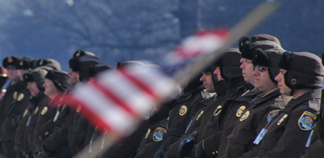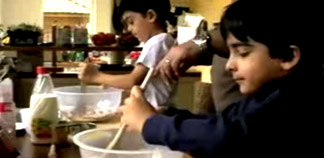به زبان فارسی
PICTORY
LATEST MUSIC
SEARCH
MEMORIES
29-Jan-2009 (9 comments)
با یکی از کارمندان ارشد وزارت خارجه حرف میزدم .برای ماموریت جدیدی به تهران می رود .چمدان اش را دیشب با هم مرتب کردیم .چند دست لباس زنانه و وسایل روزمره و پنج روسری رنگی که یکی اش را خودم برایش خریده ام و خرت و پرت های دیگه. نقشه ی بزرگ تهران را جلویش گذاشتم و همه جاهایی را که با پوست و خون و قلبم دوست دارم نشانش دادم و بی اختیار اشک همه ی صورتم را پر کرد .بی آنکه نگاهم کند گذاشت با دستمال کاغذی پاکش کنم .از دربند و خیابان شریعتی و قلهک و نیاوران و میرداماد و میدان محسنی برایش گفتم .توپخانه را نشانش دادم و از هوای مسموم تهران برایش حرف زدم. آنقدر از تهران گفتم که بی اختیار گقت: می خواهی با مسئولیت خودم ببرمت تا این همه غم غربت از پا نیاندازد ترا هادی جان!>>>
THANKS
27-Jan-2009 (10 comments)
To all who were kind enough to take pleasure in my recent selection as a lawyer of the year in Massachusetts, at first, I thought to write each of the well-wishers individually and thank them for their kind words, encouragement and the reminder about some fruity object not falling far from the tree. I owe much to father and there is not a day that I do not think of him. I do not miss him in a sad way: I miss him as a player in my life’s situational comedies, who is no longer there to deliver the lines that only he would or could. I am working on my son, the wise ass, to take up where father left off. In time, I will report on the progress of that venture>>>
IDEAS
19-Jan-2009 (2 comments)
فلسفه در ایران با جمالی از خواب عمیق چندین سد ساله برمیخیزد و از پیلهی سخت پرسشهای مزمن سر برون میآورد. در فلسفه پرسشها همواره برتر از پاسخهایند. هر پرسش پیشپا افتادهای پاسخی متناسب با ارزشهای حاکم بر جامعه دارد. اما هیچ پرسشی برای یک فیلسوف بیارزش نیست. چه نخستین چیزی که یک فیلسوف را از دیگر اندیشمندان جامعهاش متمایز میسازد، نادیدهگرفتن ارزشهای حاکم از سوی او و تلاش برای جایگزینی آنها با کشف و یا آفرینش و برتر شمردن ارزشهای نوین است. محفوظات فلسفی کسی را فیلسوف نمیکند، گرچه آنها لازمهی کار فیلسوفاند؛ و نه حتا این و یا آن اندیشهی فلسفی که هر از گاه از انسان تراوش میکند. فیلسوف پژوهشگری بیامان است که با پرسشهای خود در زمینهی چگونهاندیشی و چگونهزیستی به کشفیات و از همین راه نیز به آفرینشی نوین دست میزند.>>>
2009
04-Jan-2009 (4 comments)
As long as we are alive (and alas, many are not), and we still have a functioning mind and heart, and good friends to remind us of that, we can still live a worthy life: Simply absorb the meaning of the characters inscribed on the Tsukubai (water basin) behind the Rock Garden in at the Ryoanji Temple in Kyoto: "I learn to be content". These five words can be understood in different ways, but when I came across them in January, I realized that we, Iranians, got it all wrong when we followed the carpe diem philosophy of Khayyam, when he claimed, a wine cup in one hand and the tresses of his beloved in the other:>>>
MEAT
25-Dec-2008 (5 comments)
“Feliss Nabbidad!” yells dad. “Happy birthday Jesus!” – it’s always a bad idea to stay at your parents' on Christmas Eve. Cheery Mexican brass blares from the stereo.
“What's that noise dad?”
“Happy Christmas!” he shouts. “No sleigh balls in Mexico Christmas. I hate sleigh balls.”
“Sleigh bells, baba. Not balls.”
“¡Próspero año nuebbo!”
“It’s 9am!” I shout.
“Six hours to Queen's speech.”
PERCEPTIONS
23-Dec-2008 (7 comments)
The results of a PAAIA/Zogby survey indicate that about half of all Americans have a favorable impression of Iranian Americans, as well as the Iranian people. On the other hand, about one-eighth of all Americans have an unfavorable impression of Iranian Americans and the Iranian people. Significantly, however, about one-third of Americans are not familiar with either Iranian Americans or the Iranian people. The similarity of the American public’s overall impressions of Iranian Americans and the Iranian people perhaps indicates that such impressions are in large part formed by media reports on Iran. In contrast to generally favorable impressions of Iranian Americans and the Iranian people, two-thirds of Americans have an unfavorable impression of the Iranian Government>>>
USA
22-Dec-2008 (2 comments)
The 2008 presidential elections has been said to be historical, a shift in American politics. It must have been a unique and personal experience for many, including the Iranian American population. I went to the Student Union at the University of Arizona to cast my early vote about a week prior to the Election Day. A student volunteer standing there with some papers informed me that I had to wait more than two hours before I could actually get into the room at the end of the hallway to vote. I decided to stay anyway. But immediately I tried to decide what to do while waiting. I had a campus newspaper in my hand, which I had picked up from a table as I arrived in the Union area>>>
HUMOR
18-Dec-2008 (22 comments)
Like many of my Iranian compatriots, I frequent Las Vegas for three primary reasons: gambling, alcohol and a hooker named Seema. If hookers were rated based on appeal and performance, Seema would have been up there with the best of them. Seema is beautiful -- damn beautiful. She looks something like a malnourished Bollywood star blended with Selma Hayek and a drop of Kate Moss. If that look does it for you, Seema is your girl. Her best features, by far, are her eyes. They are dark and mysterious. Her long legs, perfect nose (nose job) and bodacious tatas (implants) make her stand out in the crowd.>>>
EXILES
16-Dec-2008 (2 comments)
در تركیه خود را بیحقوق میبینم، در فرانسه پناهنده و در امریكا شهروند؛ اما در همه حال یك تبعیدی. سه صفت نخست، وضعیت قانونی مرا در كشوری كه به آن وارد شدم نشان میدهد و صفت آخرین، ذهنیت مرا نسبت به وطنی كه ناگزیر به ترك آن شدم. خواه در امریكا بمیرم، روبروی پسرم "آزاد" كه بر بالینم ایستاده و خواه به وطن بازگردم، اگر روی آزادی را ببیند، باز من یك تبعیدی خواهم ماند. درست مثل آن دریانوردی كه نوار آواز او را در كلاس درس فرانسویم در دهكدهی "شانتونه" در سال 83 شنیدم كه پس از سالها كه به میهن بازگشته بود آنجا را غریبه یافت و دوباره به سوی دریا بازگشت. نباید خود را گول بزنم: چه خود را در لسآنجلس جزیی از یك جامعهی "موفق" ایرانی امریكایی ببینم و نام این شهر را به "تهرانجلس" تغییر دهم، و چه خود را چون نادرپور شاعر غریبهای در "شیطانجلس" بینگارم، باز یك تبعیدی خواهم ماند. پس بهتر است كه به جای خودفریبی، هویت خود را بشناسم و آن را قدر بگذارم.>>>
USA
15-Dec-2008 (3 comments)
It seems that one of the trendiest things to do in the Iranian community nowadays, (other than avoiding any sort of action at all costs) is the perennial community Survey. Recently the Public Affairs Alliance of Iranian Americans (PAAIA) in Washington, DC, the latest organization with the usual need to serve, announced the results of yet another survey, this time a Zogby phone survey! This implied secret-sauce of information and revelation of who we are, that will somehow explain our superiority, and cure all our ills, inspires and invites and begs deserved criticism. Just ask me how I know!>>>
USA
11-Dec-2008 (41 comments)
The results of this PAAIA/Zogby survey indicate that nearly all Iranian Americans are either citizens (81%) or permanent residents (15%) of the United States. While their ethnic heritage is important to the vast majority of Iranian Americans in defining their identity, they appear to be well-assimilated into American society, with only one in five indicating that they interact mostly with other Iranian Americans outside of work, and more than half indicating English as the language or one of two languages most often spoken at home. The survey paints the picture of a diverse and relatively affluent Iranian American community. While two-fifths of Iranian Americans identify themselves as Muslims, almost an equal percentage appear not to practice any particular religion>>>
RECENT COMMENTS
IRANIANS OF THE DAY
| Person | About | Day |
|---|---|---|
| نسرین ستوده: زندانی روز | Dec 04 | |
| Saeed Malekpour: Prisoner of the day | Lawyer says death sentence suspended | Dec 03 |
| Majid Tavakoli: Prisoner of the day | Iterview with mother | Dec 02 |
| احسان نراقی: جامعه شناس و نویسنده ۱۳۰۵-۱۳۹۱ | Dec 02 | |
| Nasrin Sotoudeh: Prisoner of the day | 46 days on hunger strike | Dec 01 |
| Nasrin Sotoudeh: Graffiti | In Barcelona | Nov 30 |
| گوهر عشقی: مادر ستار بهشتی | Nov 30 | |
| Abdollah Momeni: Prisoner of the day | Activist denied leave and family visits for 1.5 years | Nov 30 |
| محمد کلالی: یکی از حمله کنندگان به سفارت ایران در برلین | Nov 29 | |
| Habibollah Golparipour: Prisoner of the day | Kurdish Activist on Death Row | Nov 28 |
















